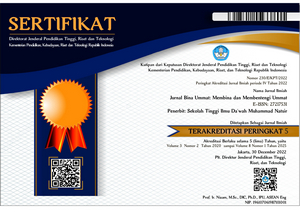EFFECTIVENESS OF E-LEARNING IN TEACHING ISLAMIC CHEMISTRY: BUILDING AN ISLAMIC SOCIETY WITH COMPREHENSIVE UNDERSTANDING OF CHEMISTRY AND ISLAMIC VALUES
DOI:
https://doi.org/10.38214/jurnaldawahstidnatsir.v6i1.181Keywords:
e-learning, Islamic Chemistry, Islamic SocietyAbstract
This research investigates the effectiveness of e-learning methods in teaching Islamic chemistry and their contribution to fostering an Islamic society with a comprehensive understanding of chemistry and Islamic values. The study focuses on the integration of Islamic values into chemistry education using online learning platforms. Adopting a qualitative approach with a case study design, the research involves students participating in an e-learning program for Islamic chemistry. Data is collected through observations, interviews, and document analysis to explore students' interactions with the e-learning platform and their responses to the integration of Islamic values. Thematic analysis is employed for data analysis. The findings highlight the significant impact of e-learning methods in teaching Islamic chemistry, enhancing students' understanding of both the subject matter and Islamic values. The integration of Islamic values in chemistry education promotes a deeper comprehension of the connections between chemistry and Islamic teachings. However, challenges such as technical issues and effective online communication need to be addressed.
Published
Versions
- 2023-08-02 (2)
- 2023-06-13 (1)
- 2023-06-24 ()
How to Cite
Issue
Section

This work is licensed under a Creative Commons Attribution 4.0 International License.
This work is licensed under a Lisensi Creative Commons Atribusi 4.0 Internasional.
Authors who publish with this journal agree to the following terms:
- Authors retain copyright and grant the journal right of first publication with the work simultaneously licensed under a�Creative Commons Attribution License that allows others to share the work with an acknowledgment of the work's authorship and initial publication in this journal.
- Authors are able to enter into separate, additional contractual arrangements for the non-exclusive distribution of the journal's published version of the work (e.g., post it to an institutional repository or publish it in a book), with an acknowledgment of its initial publication in this journal.
- Authors are permitted and encouraged to post their work online (e.g., in institutional repositories or on their website) prior to and during the submission process, as it can lead to productive exchanges, as well as earlier and greater citation of published work (See�The Effect of Open Access).




